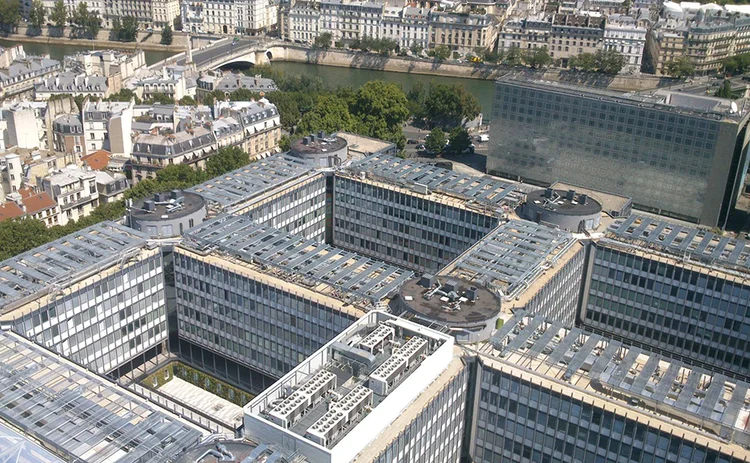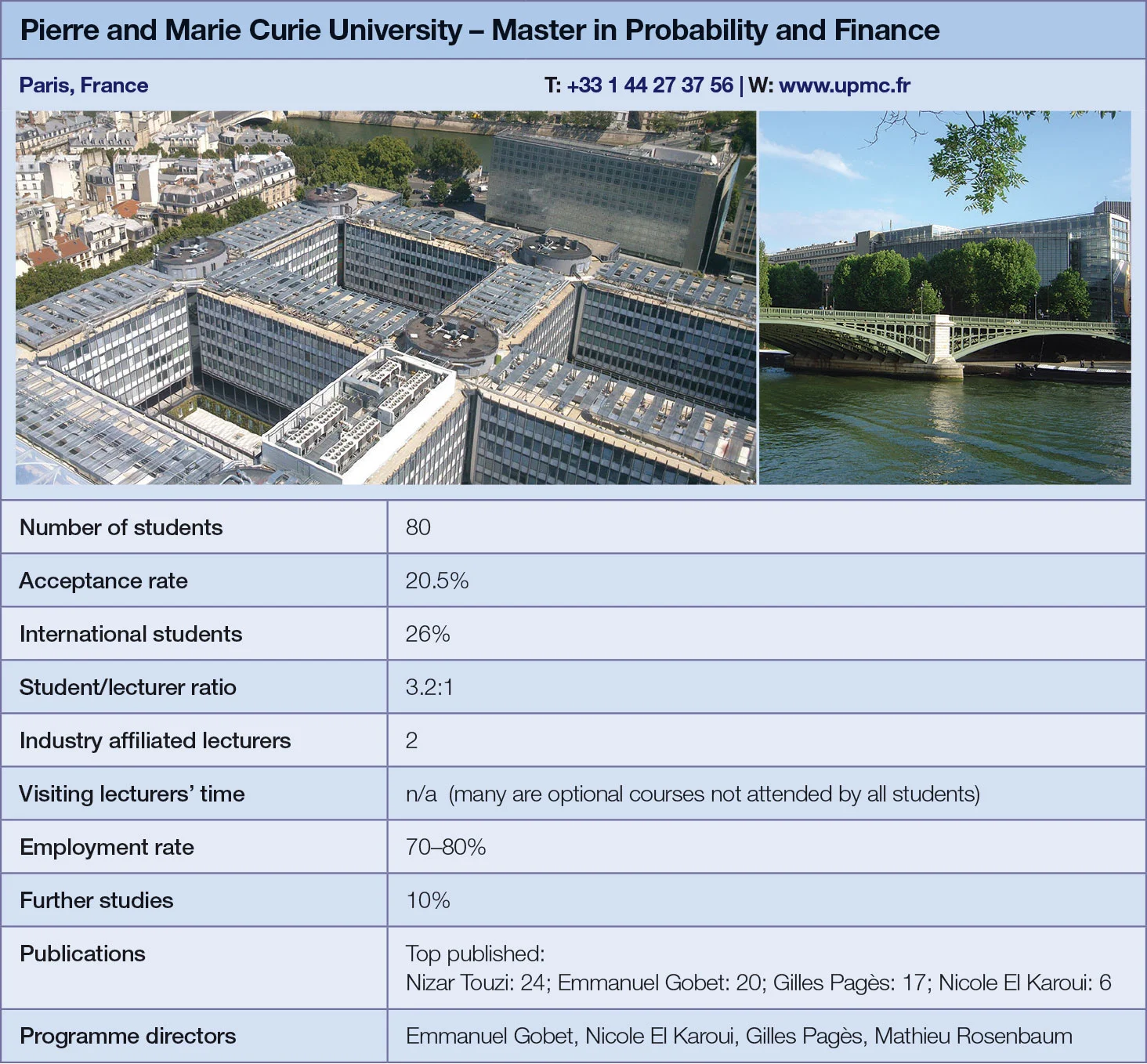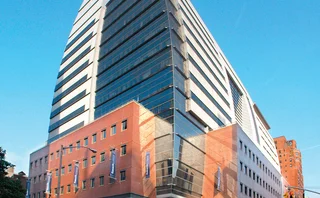
Quant Guide 2017: Pierre and Marie Curie University
Paris, France

Master in Probability and Finance | metrics table at end of article
This one-year master’s offered by Pierre and Marie Curie University (UPMC) in Paris and Ecole polytechnique is known for the mathematical calibre of its graduates. The entry requirements are high, warns a co-director of the programme, Gilles Pagès. “We are extremely demanding in terms of mathematical level.”
The French-language programme was designed in 1991 by Nicole El Karoui, a renowned mathematician who remains co-director. Unlike most master’s degrees, this programme requires a previous master’s to qualify and is aimed almost exclusively at mathematicians. About 80 students are admitted each year and there are no plans to expand this number, even though the demand is there: five times as many students applied in the current academic year.
Highlights of the programme include courses on diffusion processes, Monte Carlo methods in finance, and stochastic processes and derivative products. This third course applies the material in the first two to financial modelling. “Rather than teaching them a very specific model with all the solutions and formulas, we instead explain how to derive those formulas from models,” says Pagès. “So in some sense it’s rather abstract and theoretic.”
Programming skills are another focus of the master’s, and part of the Monte Carlo methods course involves a computational project. Here students will read a research paper on mathematical finance from a journal, implement it by writing a computational programme and then analyse the results. Two or more similar computational projects are then completed in other courses later in the year. Students are expected to have a knowledge of programming languages before joining.
The programme also includes plenty of more applied courses such as in statistical methods for finance. This course looks into order execution and high-frequency trading, for example. There are also courses covering bitcoin, and fintech more generally. Following the financial crisis, the programme was expanded to provide a better understanding of how the financial industry works, how it’s regulated and how it has developed historically.
Many of the more applied courses are taught by industry practitioners. For example, Charles-Albert Lehalle, a senior quant at Capital Fund Management, teaches quantitative trading, while Pierre Henry-Labordère, a quant at Societe Generale and winner of the 2013 Quant of the Year Risk.net award, teaches non-linear pricing.
“They are still rather theoretical and rigorous from a mathematical point of view, but they are directly focused on the applications,” Pagès says. “The word ‘finance’ almost never appears in the course on stochastic calculus. By contrast, with the course on statistical methods for finance we always start from a financial problem, financial product or financial hedging strategy.”
As with other French master’s courses, internships are mandatory. They last five months and begin in April after exams have finished. Networking opportunities are also available, with Societe Generale annually inviting students to social events, as well as a cocktail party hosted by the university at the end of the year. Two or three hundred people attend this event, including alumni and professional partners. The LinkedIn alumni network is large and active, Pagès says.

Julie Othman graduated in 2012 and now works as a quantitative analyst for Rokos Capital Management in London. Although quants use stochastic calculus less and less, Othman says an understanding of it is crucial to professional quants’ work, and she was impressed with how it was taught at UPMC.
“There is a course on stochastic calculus, which was one of the best courses I have ever experienced,” says Othman. “El Karoui has a way of presenting stochastic calculus that is very clear and very methodical.”
Another graduate, Quentin Lintzer, completed the programme in 2007 and is currently executive director of cross-asset trading at Crédit Agricole’s corporate and investment bank. Before joining UPMC, also known as Paris VI, Lintzer gained a master’s in economics at the London School of Economics and a bachelor’s in engineering from Ecole nationale des ponts et chaussées.
“The master’s is at the crossroads of the mathematical world, the computer science world and the financial world,” says Lintzer, “and it really puts a lot of emphasis on the mathematical content of all the financial mathematics theory.”
The programme aims to help graduates to go beyond just quantitative analyst roles, equipping them with knowledge helpful in other areas, such as trading – as was the case for Lintzer.
“The great thing that I think most people enjoy having graduated from Paris VI is that because we’ve spent so much time on the theory, it becomes second nature,” he says. “So if we need to discover a new product or go into the details of the pricing of a new structure, we are able to perform analysis under pressure and that does fit in to a dealing room quite naturally.”
To be competitive in the current market, Lintzer believes it’s important to have skills in data and statistical analysis. This is an area covered at UPMC with courses on statistical methods and high-dimensional data. Further courses on topics such as deep learning are being looked into.

Click here for links to the other universities and an explanation of how to read the metrics tables
Only users who have a paid subscription or are part of a corporate subscription are able to print or copy content.
To access these options, along with all other subscription benefits, please contact info@risk.net or view our subscription options here: http://subscriptions.risk.net/subscribe
You are currently unable to print this content. Please contact info@risk.net to find out more.
You are currently unable to copy this content. Please contact info@risk.net to find out more.
Copyright Infopro Digital Limited. All rights reserved.
You may share this content using our article tools. Printing this content is for the sole use of the Authorised User (named subscriber), as outlined in our terms and conditions - https://www.infopro-insight.com/terms-conditions/insight-subscriptions/
If you would like to purchase additional rights please email info@risk.net
Copyright Infopro Digital Limited. All rights reserved.
You may share this content using our article tools. Copying this content is for the sole use of the Authorised User (named subscriber), as outlined in our terms and conditions - https://www.infopro-insight.com/terms-conditions/insight-subscriptions/
If you would like to purchase additional rights please email info@risk.net
More on Quantitative finance
Quant Finance Master’s Guide 2023
Risk.net’s guide to the world’s leading quant master’s programmes, with the top 25 schools ranked
Baruch topples Princeton in Risk.net’s quant master’s rankings
US schools cement top five dominance as graduate salaries soar
Is it worth doing a quant master’s degree?
UBS’s Gordon Lee – veteran quant and grad student supervisor – asks the hard question
Starting salaries jump for top quant grads
Quant Guide 2022: Goldman’s move to pay postgrads more is pushing up incomes, says programme director
Quant Finance Master’s Guide 2022
Risk.net’s guide to the world’s leading quant master’s programmes, with the top 25 schools ranked
Princeton, Baruch and Berkeley top for quant master’s degrees
Eight of 10 leading schools for quantitative finance programmes are based in US, latest rankings show
Quant grad conveyor belt stalls as banks retrench
Jobs market is long quant graduates, short vacancies – but hiring freeze shows signs of thawing
Quant Finance Master’s Guide 2021
Risk.net’s guide to the world’s leading quant master’s programmes, with the top 25 schools ranked







